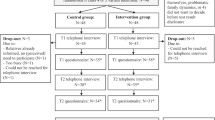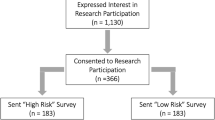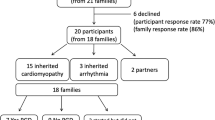Abstract
Inherited cardiac conditions (ICCs) can lead to sudden cardiac death at young age, even without previous symptoms, yet often remain undetected. To prevent sudden cardiac death, cardiac monitoring and/or predictive DNA testing is advised for at-risk relatives. Probands in whom a causal variant is detected are asked to inform their relatives about the possibility of testing, often supported by a family letter. This qualitative study investigates experiences with and attitudes toward this family-mediated approach in ICCs and explores whether and how improvements can be made. Two online focus groups were conducted with 28 healthcare professionals (HCPs) from various disciplines, as were 25 face-to-face semi-structured interviews with counselees (10 probands; 15 relatives). Data were analysed by two researchers independently using a thematic approach. Participants, both HCPs and counselees, preferred that probands inform relatives about genetic risks in ICCs, but both groups struggled with the dependency on and burden on probands to inform their relatives. To overcome this, HCPs do see a more active role for themselves in informing relatives, but prefer uniformity in procedures in order to maintain their workload. Counselees, on the other hand, prefer a tailored information provision strategy adjusted to family dynamics and the personality characteristics of relatives. In conclusion, although it is generally preferred that probands inform relatives themselves, a more active role of HCPs could be considered to overcome the dependency and burden on probands. Further research is needed to study how HCPs can engage more actively in informing at-risk relatives in current clinical genetic practise.
Similar content being viewed by others
Log in or create a free account to read this content
Gain free access to this article, as well as selected content from this journal and more on nature.com
or
References
Maron BJ. Risk stratification and role of implantable defibrillators for prevention of sudden death in patients with hypertrophic cardiomyopathy. Circ J. 2010;74:2271–82.
Priori SG, Wilde AA, Horie M, Cho Y, Behr ER, Berul C, et al. HRS/EHRA/APHRS expert consensus statement on the diagnosis and management of patients with inherited primary arrhythmia syndromes: document endorsed by HRS, EHRA, and APHRS in May 2013 and by ACCF, AHA, PACES, and AEPC in June 2013. Heart Rhythm. 2013;10:1932–63.
Behr ER, Dalageorgou C, Christiansen M, Syrris P, Hughes S, Tome Esteban MT, et al. Sudden arrhythmic death syndrome: familial evaluation identifies inheritable heart disease in the majority of families. Eur Heart J. 2008;29:1670–80.
Miller EM, Wang Y, Ware SM. Uptake of cardiac screening and genetic testing among hypertrophic and dilated cardiomyopathy families. J Genet Couns. 2013;22:258–67.
Leenen CH, Heijer M, van der Meer C, Kuipers EJ, van Leerdam ME, Wagner A. Genetic testing for Lynch syndrome: family communication and motivation. Fam Cancer. 2016;15:63–73.
Christiaans I, Birnie E, Bonsel GJ, Wilde AA, van Langen IM. Uptake of genetic counselling and predictive DNA testing in hypertrophic cardiomyopathy. Eur J Hum Genet. 2008;16:1201–7.
Van der Roest WP, Pennings JM, Bakker M, van den Berg MP, van Tintelen JP. Family letters are an effective way to inform relatives about inherited cardiac disease. Am J Med Genet A. 2009;149A:357–63.
Burns C, McGaughran J, Davis A, Semsarian C, Ingles J. Factors influencing uptake of familial long QT syndrome genetic testing. Am J Med Genet A. 2016;170A:418–25.
Clarke A, Richards M, Kerzin-Storrar L, Halliday J, Young MA, Simpson SA, et al. Genetic professionals’ reports of nondisclosure of genetic risk information within families. Eur J Hum Genet. 2005;13:556–62.
Falk MJ, Dugan RB, O’Riordan MA, Matthews AL, Robin NH. Medical Geneticists’ duty to warn at-risk relatives for genetic disease. Am J Med Genet A. 2003;120A:374–80.
Forrest LE, Burke J, Bacic S, Amor DJ. Increased genetic counseling support improves communication of genetic information in families. Genet Med. 2008;10:167–72.
Hodgson JM, Metcalfe S, Gaff C, Donath S, Delatycki MB, Winship I, et al. Outcomes of a randomised controlled trial of a complex genetic counselling intervention to improve family communication. Eur J Hum Genet. 2016;24:356–60.
Aktan-Collan K, Haukkala A, Pylvanainen K, Jarvinen HJ, Aaltonen LA, Peltomaki P, et al. Direct contact in inviting high-risk members of hereditary colon cancer families to genetic counselling and DNA testing. J Med Genet. 2007;44:732–8.
Menko FH, Ter Stege JA, van der Kolk LE, Jeanson KN, Schats W, Moha DA, et al. The uptake of presymptomatic genetic testing in hereditary breast-ovarian cancer and Lynch syndrome: a systematic review of the literature and implications for clinical practice. Fam Cancer. 2019;18:127–35.
Sermijn E, Delesie L, Deschepper E, Pauwels I, Bonduelle M, Teugels E, et al. The impact of an interventional counselling procedure in families with a BRCA1/2 gene mutation: efficacy and safety. Fam Cancer. 2016;15:155–62.
Suthers GK, Armstrong J, McCormack J, Trott D. Letting the family know: balancing ethics and effectiveness when notifying relatives about genetic testing for a familial disorder. J Med Genet. 2006;43:665–70.
Sturm AC. Cardiovascular cascade genetic testing: exploring the role of direct contact and technology. Front Cardiovasc Med. 2016;3:11.
Dheensa S, Fenwick A, Shkedi-Rafid S, Crawford G, Lucassen A. Health-care professionals’ responsibility to patients’ relatives in genetic medicine: a systematic review and synthesis of empirical research. Genet Med. 2016;18:290–301.
Kitzinger J. Qualitative research. Introducing focus group. BMJ. 1995;311:299–302.
Dheensa S, Lucassen A, Fenwick A. Limitations and pitfalls of using family letters to communicate genetic risk: a qualitative study with patients and healthcare professionals. J Genet Couns. 2018;27:689–701.
Ormondroyd E, Oates S, Parker M, Blair E, Watkins H. Pre-symptomatic genetic testing for inherited cardiac conditions: a qualitative exploration of psychosocial and ethical implications. Eur J Hum Genet. 2014;22:88–93.
Ratnayake P, Wakefield CE, Meiser B, Suthers G, Price MA, Duffy J, et al. An exploration of the communication preferences regarding genetic testing in individuals from families with identified breast/ovarian cancer mutations. Fam Cancer. 2011;10:97–105.
VERBI Software. MAXQDA 2018. Berlin (Germany): VERBI software; 2017.
Braun V, Clarke V. Using thematic analysis in psychology. Qual Res Psychol. 2006;3:77–101.
Weaver M. The double helix: applying an ethic of care to the duty to warn genetic relatives of genetic information. Bioethics . 2016;30:181–7.
Newson AJ, Humphries SE. Cascade testing in familial hypercholesterolaemia: how should family members be contacted? Eur J Hum Genet. 2005;13:401–8.
Stol YH, Menko FH, Westerman MJ, Janssens RM. Informing family members about a hereditary predisposition to cancer: attitudes and practices among clinical geneticists. J Med Ethics. 2010;36:391–5.
Leonard SJ, Newson, AJ. Ethical perspectives. In: Gaff CL, Bylund, CL, editors. Family communication about genetics: theory and practice. New York: Oxford University Press, Inc.; 2010.
Vavolizza RD, Kalia I, Erskine Aaron K, Silverstein LB, Barlevy D, Wasserman D, et al. Disclosing genetic information to family members about inherited cardiac arrhythmias: an obligation or a choice? J Genet Couns. 2015;24:608–15.
Whyte S, Green A, McAllister M, Shipman H. Family communication in inherited cardiovascular conditions in Ireland. J Gen Couns. 2016;25:1317–26.
Shah LL, Daack-Hirsch S. Family communication about genetic risk of hereditary cardiomyopathies and arrhythmias: an integrative review. J Genet Couns. 2018;27:1022–39.
Dilzell K, Kingham K, Ormond K, Ladabaum U. Evaluating the utilization of educational materials in communicating about Lynch syndrome to at-risk relatives. Fam Cancer. 2014;13:381–9.
Forrest LE, Curnow L, Delatycki MB, Skene L, Aitken M. Health first, genetics second: exploring families’ experiences of communicating genetic information. Eur J Hum Genet. 2008;16:1329–35.
Menko FH, Aalfs CM, Henneman L, Stol Y, Wijdenes M, Otten E, et al. Informing family members of individuals with Lynch syndrome: a guideline for clinical geneticists. Fam Cancer. 2013;12:319–24.
Acknowledgements
We thank the experts on legal and ethical issues and members of patient organizations for sharing their perspectives and their reflection on our findings. We also thank Kate McIntyre for editing the manuscript. We acknowledge the support from the Netherlands Cardiovascular Research Initiative: An initiative with support of the Dutch Heart Foundation (CVON 2015-12 eDETECT).
Author information
Authors and Affiliations
Corresponding author
Ethics declarations
Conflict of interest
The authors declare that they have no conflict of interest.
Additional information
Publisher’s note: Springer Nature remains neutral with regard to jurisdictional claims in published maps and institutional affiliations.
Supplementary information
Rights and permissions
About this article
Cite this article
van den Heuvel, L.M., Huisinga, M.J., Hoedemaekers, Y.M. et al. Informing relatives at risk of inherited cardiac conditions: experiences and attitudes of healthcare professionals and counselees. Eur J Hum Genet 27, 1341–1350 (2019). https://doi.org/10.1038/s41431-019-0410-9
Received:
Revised:
Accepted:
Published:
Issue date:
DOI: https://doi.org/10.1038/s41431-019-0410-9
This article is cited by
-
Health professionals contacting patients’ relatives directly about genetic risk (with patient consent): current clinical practice and perspectives
European Journal of Human Genetics (2025)
-
Mental Health Care for Children with Heart Disease and Their Families: Practical Approaches and Considerations for the Pediatric and Pediatric Cardiology Clinician
Pediatric Cardiology (2025)
-
A tailored approach to informing relatives at risk of inherited cardiac conditions: results of a randomised controlled trial
European Journal of Human Genetics (2022)
-
Simulating the Genetics Clinic of the Future — whether undergoing whole-genome sequencing shapes professional attitudes
Journal of Community Genetics (2022)



